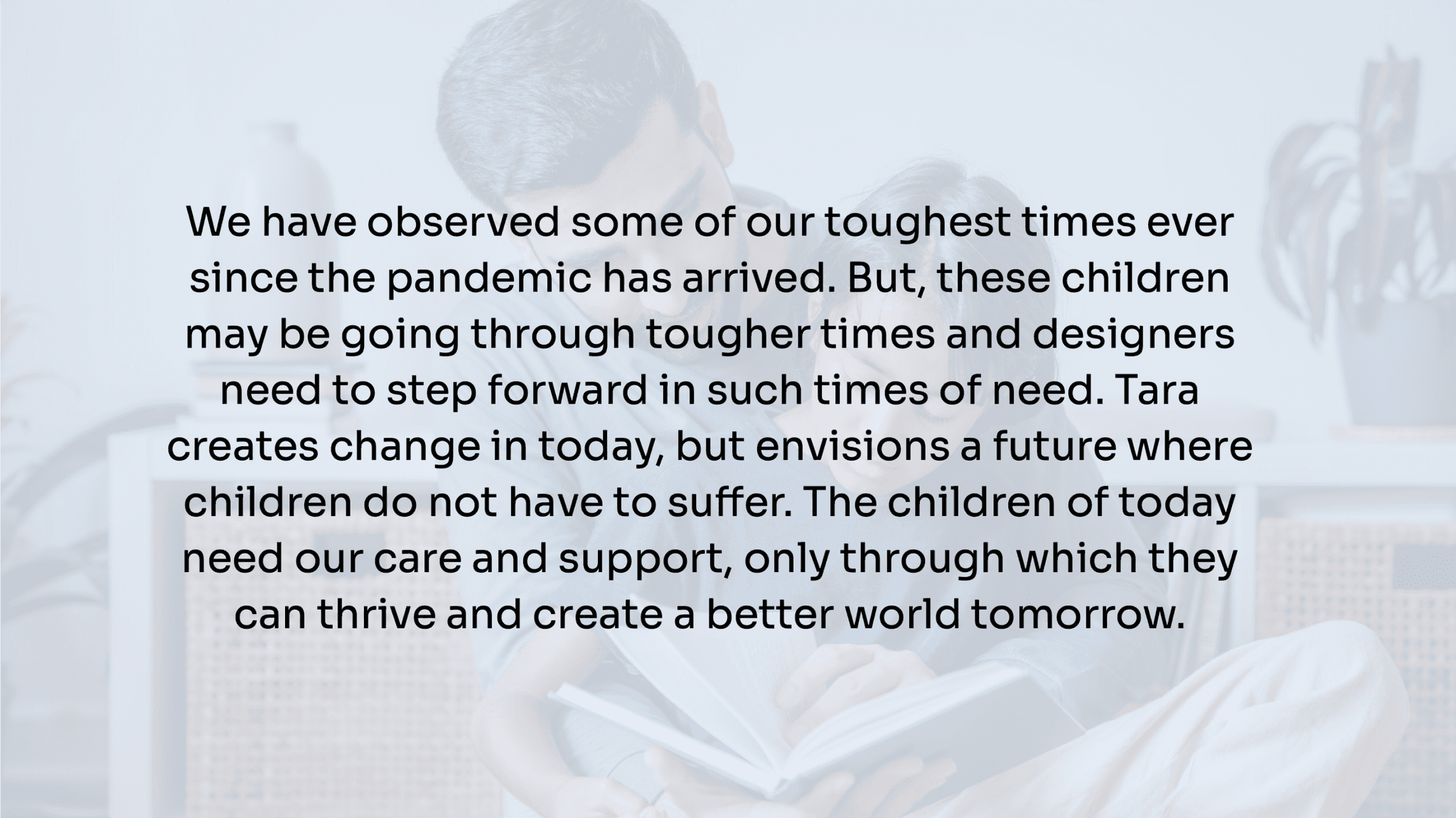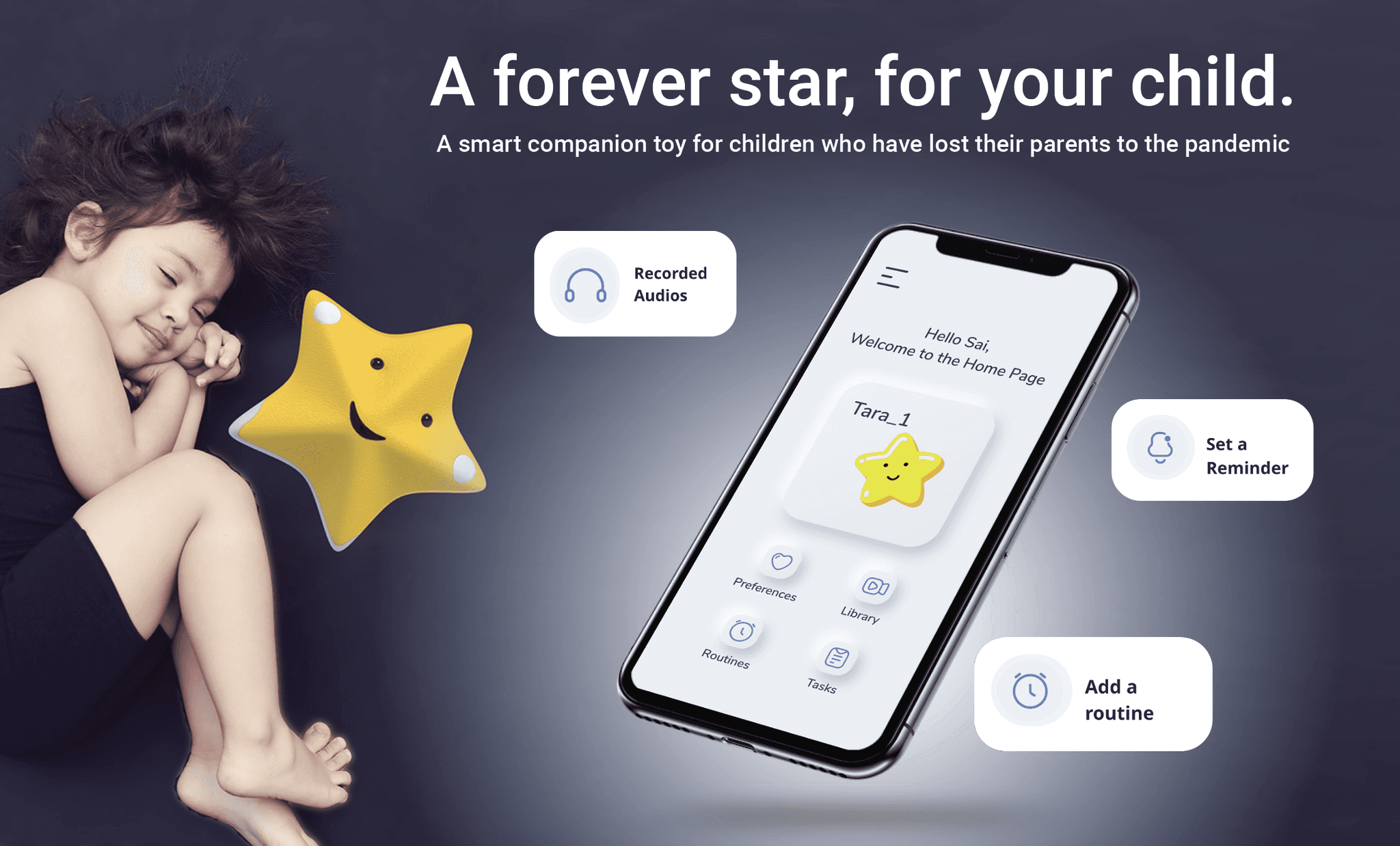
Tara: The Companion of Hope
Providing comfort and care to children through AI-powered companionship.

24
Hour Challenge
Finalist in the DI Designathon 2021, recognized for its innovative use of AI to provide emotional support to children impacted by COVID-19.
Summary:
Tara is an AI-powered companion toy designed to support children aged 6-10 who have lost their parents during the COVID-19 pandemic. Combining soft materials with embedded electronics and machine learning, Tara serves as a comforting companion that engages children in meaningful conversations, helping them express their emotions, stay grounded in daily routines, and feel connected in times of grief. Through a companion app, caregivers can monitor and customize the experience, ensuring ongoing emotional support. Tara addresses a critical gap in mental health care for children, providing a long-term solution for their emotional well-being.
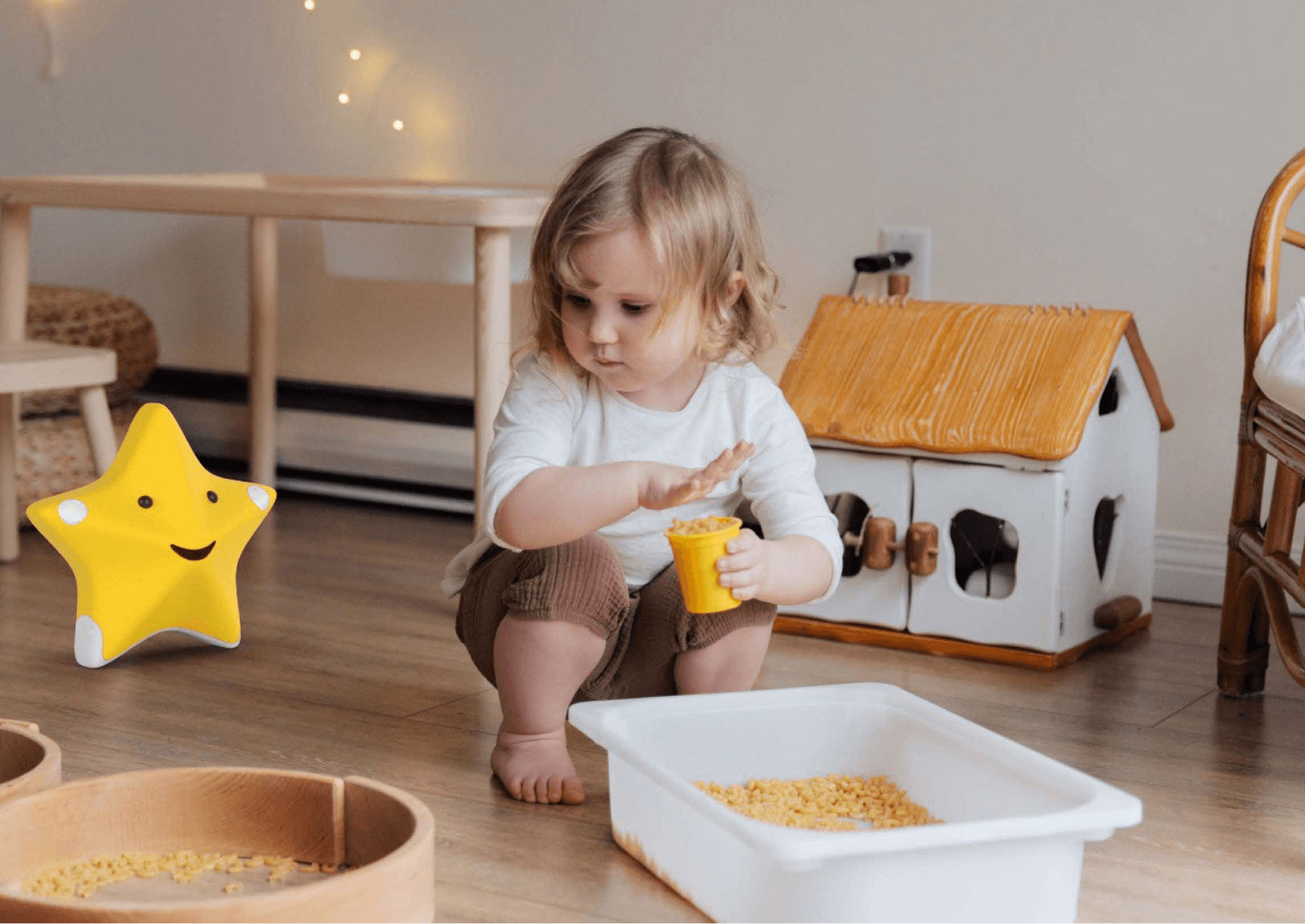
Process
Defining the Problem
The COVID-19 pandemic left countless children without parents or caregivers, triggering a mental health crisis for many. In India, there are few mental health support systems designed specifically for bereaved children, leaving them vulnerable to long-term emotional and psychological trauma. Societal stigma around therapy further exacerbates the issue, making it difficult for grieving children to access the care they need. The challenge was to design an accessible, effective solution that could provide emotional support to children coping with the loss of their caregivers during such a fragile time.
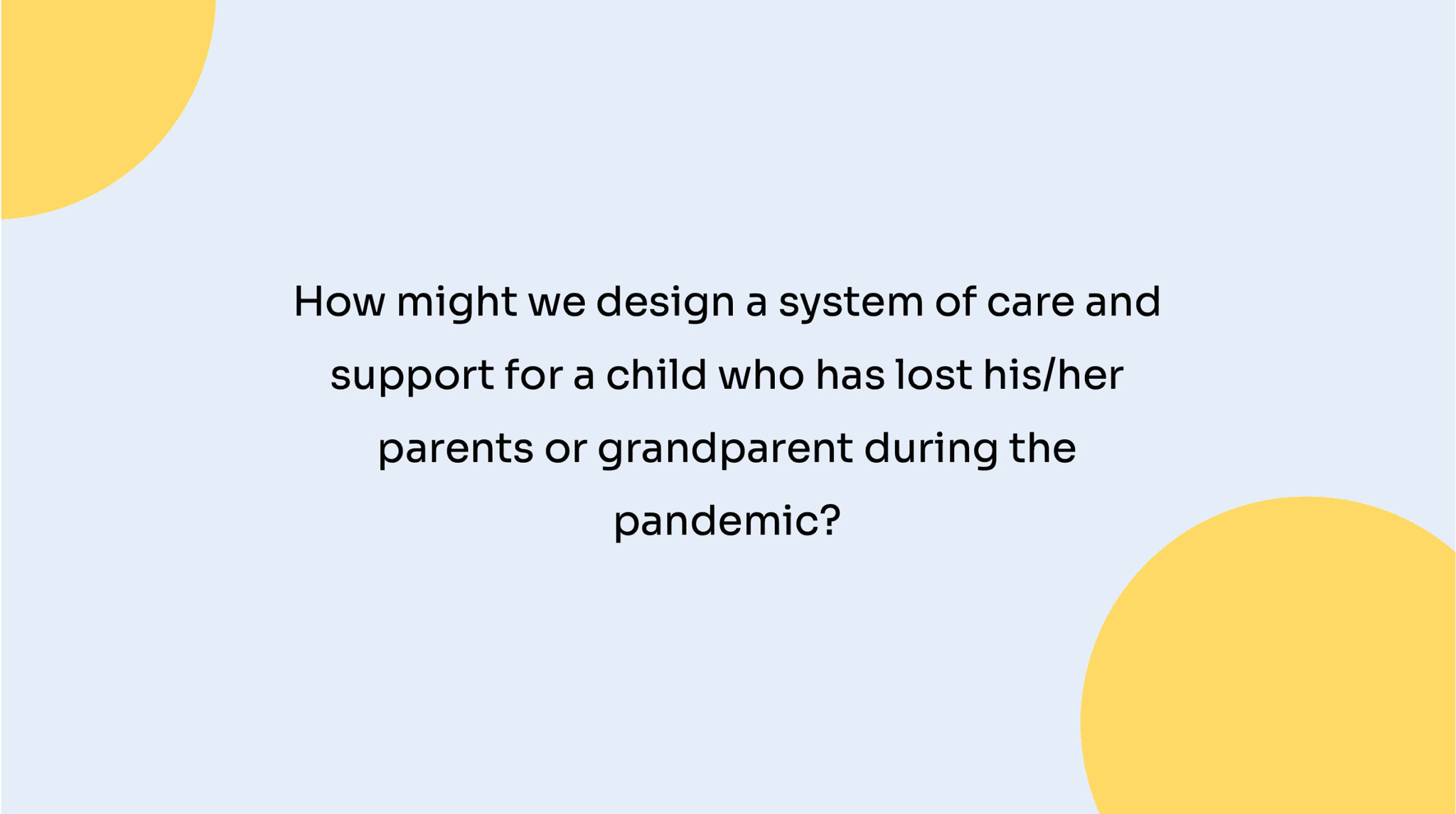
Service Concept:
Tara is an AI-powered companion toy designed to provide emotional care and support for children aged 6-10 who have lost a parent or caregiver during the pandemic. The concept revolves around a soft, comforting toy embedded with smart technology that can communicate with children, provide them with a sense of companionship, and help them express their emotions. Tara also serves as a bridge between the child and their caregiver, enabling remote emotional support through a companion app. The system provides interactive AI conversations, emotional check-ins, and personalized reminders, helping children cope with grief and maintain daily routines.
Research
Process
The research phase of Project Tara was critical to understanding the emotional and psychological challenges faced by children who had lost their parents or caregivers during the pandemic. The goal was to identify the specific needs of bereaved children and determine how best to provide emotional support in a way that is effective, accessible, and culturally appropriate. The research aimed to gather insights on child bereavement, societal stigmas around mental health, and existing gaps in support systems.
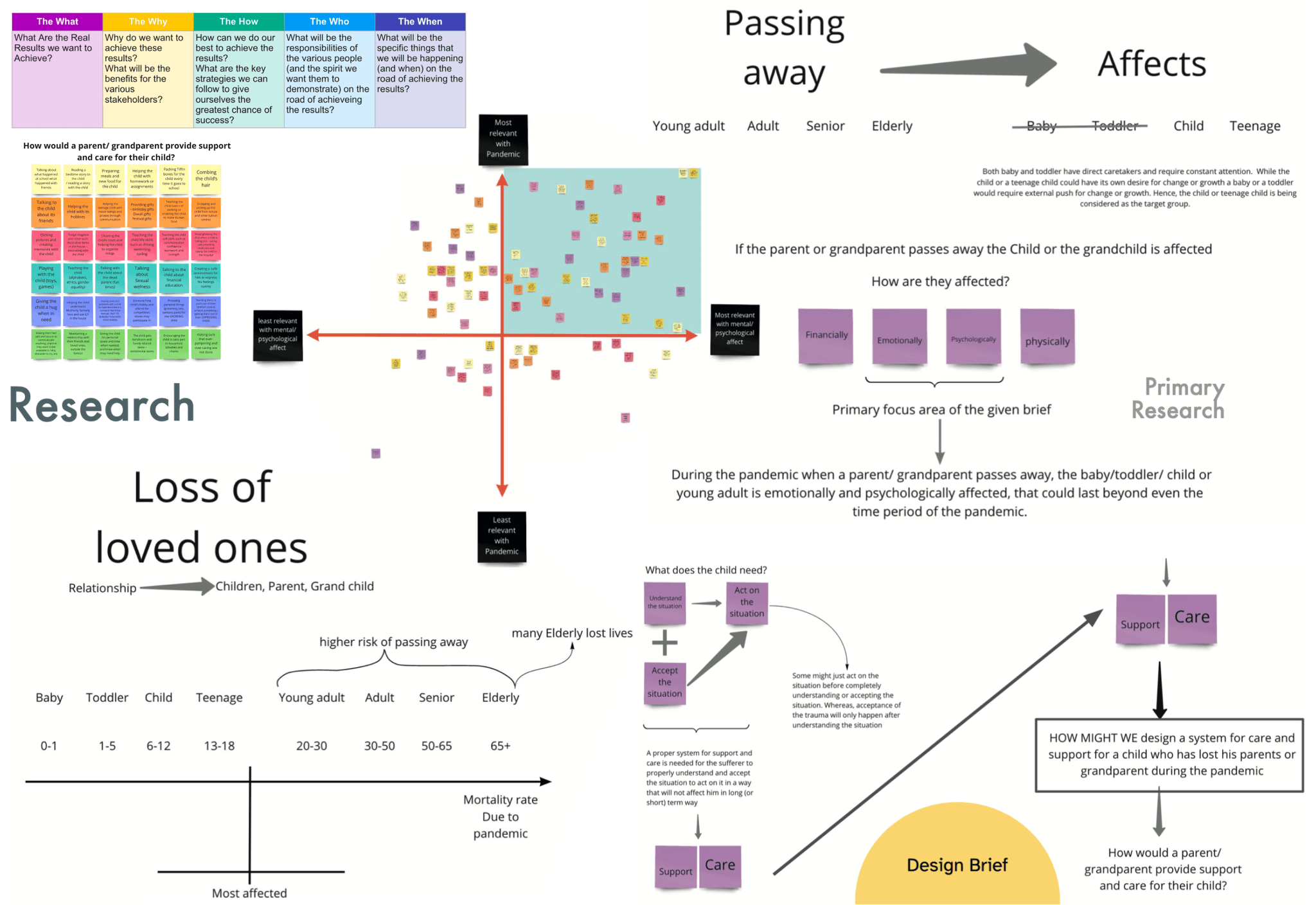
What Was Done:
Secondary Research:
We conducted extensive secondary research to gather global and local data on child bereavement due to COVID-19. This included exploring psychological studies on the impact of grief on children, government initiatives like the PM-CARES for Children scheme, and existing mental health support systems.
Target Audience Definition:
The research focused on identifying the most vulnerable group: children aged 6-10, as this age group is highly emotionally dependent on their caregivers. We examined how loss manifests in children at this stage and how they process emotions differently from teenagers or adults.
Understanding Caregiver Roles:
Investigating the responsibilities of caregivers in such situations was crucial. We aimed to understand what emotional support caregivers could provide and what technology could do to bridge the gap, especially when caregivers are not physically present.
Psychological Needs Assessment:
We identified psychological indicators in bereaved children, such as withdrawal, anxiety, nightmares, and aggression, to better understand how Tara could respond to these signs of distress through AI-powered conversations.
Research Goals:
Understand the psychological effects of parental loss on children.
Identify the emotional gaps that traditional mental health services are not addressing.
Explore cultural stigmas around therapy and mental health in India, particularly for children.
Investigate the potential for technology to offer companionship and emotional support in place of a caregiver.
Research
Tools and Methodologies Used
Literature Review:
A thorough review of mental health journals, UNICEF reports, and research papers provided an understanding of how children experience grief and what interventions work best. We also reviewed data on how the pandemic exacerbated mental health challenges for children.
Stakeholder Interviews:
Although time-constrained, we consulted with mental health professionals and caregivers to gain first-hand insights into the current state of mental health services for children in India. This helped validate our assumptions about the inadequacies in the system.
Persona Development:
Based on the data collected, we developed child personas, such as "Karan," a 9-year-old who lost his mother to COVID-19. These personas guided our ideation and design process by focusing on the emotional and psychological needs of the target audience.
Design Thinking Workshops:
We used design thinking tools like empathy mapping and journey mapping to frame the emotional states and daily routines of children post-bereavement. This allowed us to highlight pain points that Tara could address.
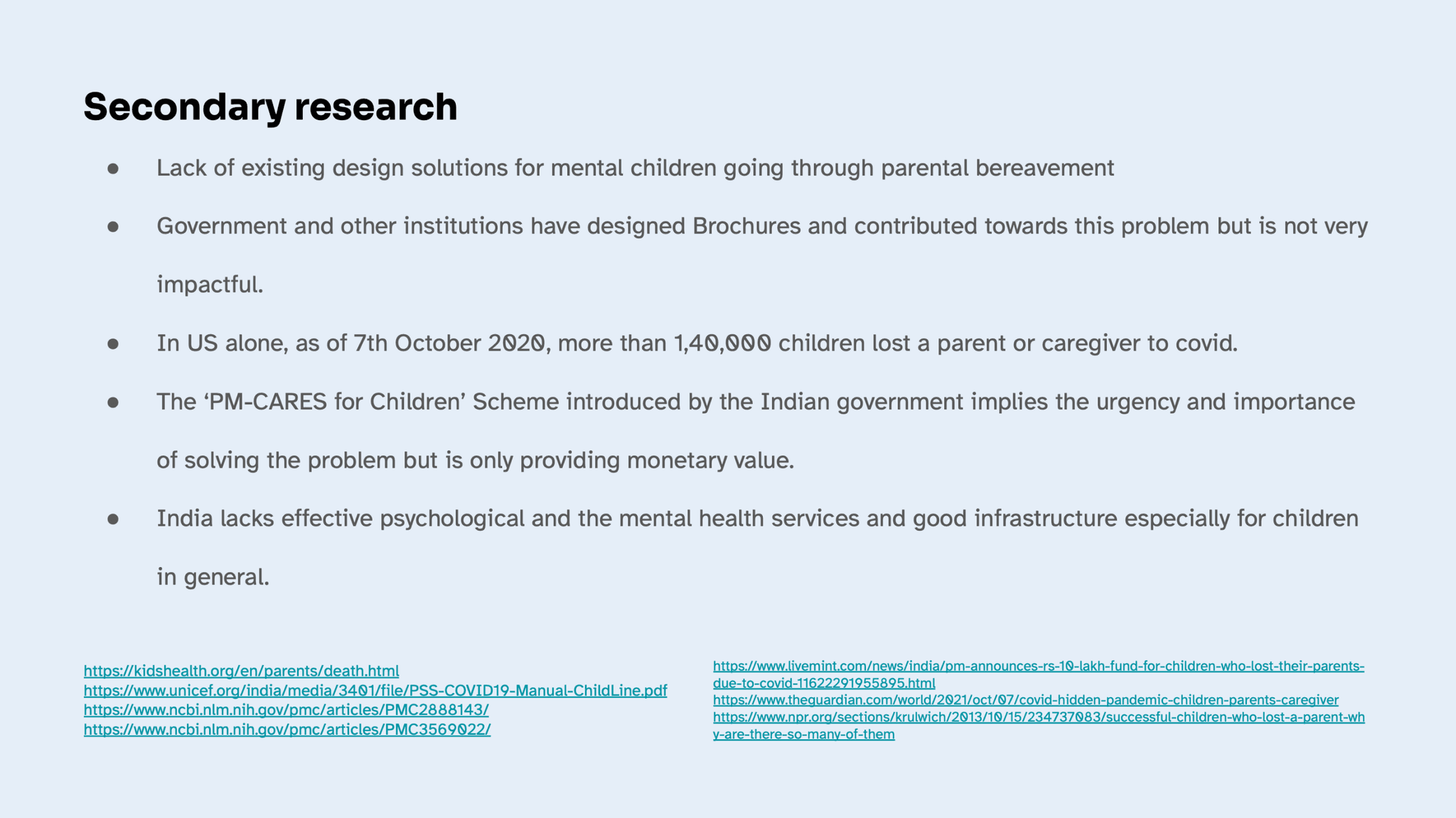
Research
Key Findings
The research phase revealed several critical insights that shaped the direction of Project Tara. These findings helped identify the gaps in emotional care for children who lost their caregivers during the pandemic and highlighted the role that technology, such as AI-powered interactions, could play in filling those gaps.
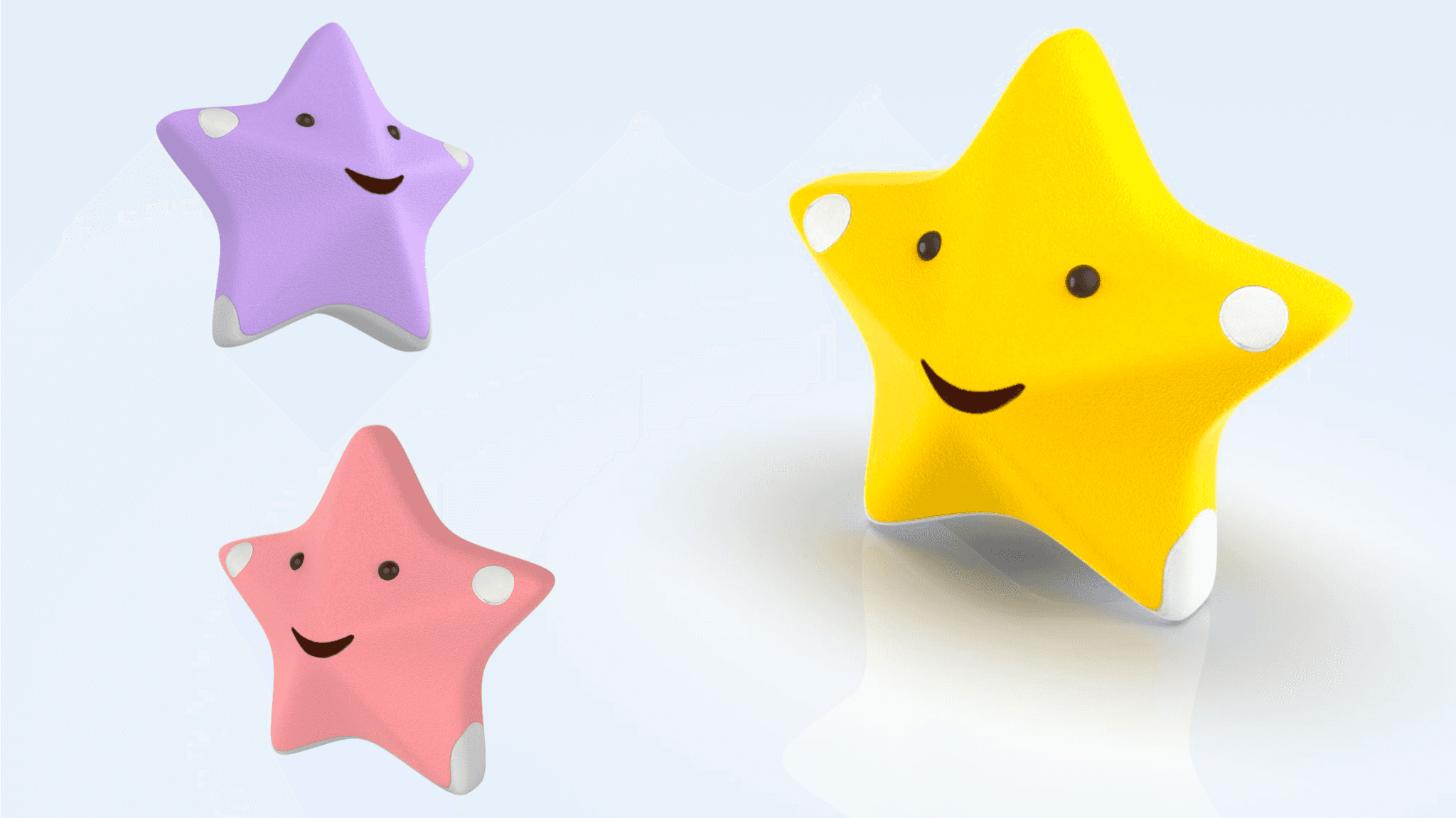
Psychological Impact of Bereavement on Children:
Children experiencing the loss of a parent or caregiver face a range of psychological challenges, including anxiety, fear, depression, and withdrawal. Key indicators of emotional distress in children include:
Difficulty sleeping or frequent nightmares.
Increased clinginess or fear of being left alone.
A reduction in interest in play or social interaction.
Frequent complaints of physical ailments with no medical cause (e.g., headaches or stomachaches).
This indicated that Tara needed to address both the emotional and psychological needs of children by offering a sense of safety, routine, and constant companionship.
Societal Stigma Around Mental Health in India:
In many Indian households, mental health and therapy are often taboo subjects. Parents and caregivers are hesitant to seek psychological help for their children due to societal pressure and lack of awareness. This stigma creates a barrier to emotional care, meaning many children are left without professional support during crucial times.
This finding emphasized the need for a non-intrusive and culturally sensitive solution like Tara, which could subtly provide emotional support without the stigma associated with therapy.
Limited Availability of Child-Focused Mental Health Solutions:
While there are government initiatives like the PM-CARES for Children scheme, which provides financial assistance to children who lost caregivers due to COVID-19, there are no comprehensive emotional or psychological support systems specifically designed for children. Most resources are focused on adults, leaving children under-supported.
This gap pointed to an opportunity for Tara to become a child-specific emotional support system that helps children deal with trauma in a personalized and accessible way.
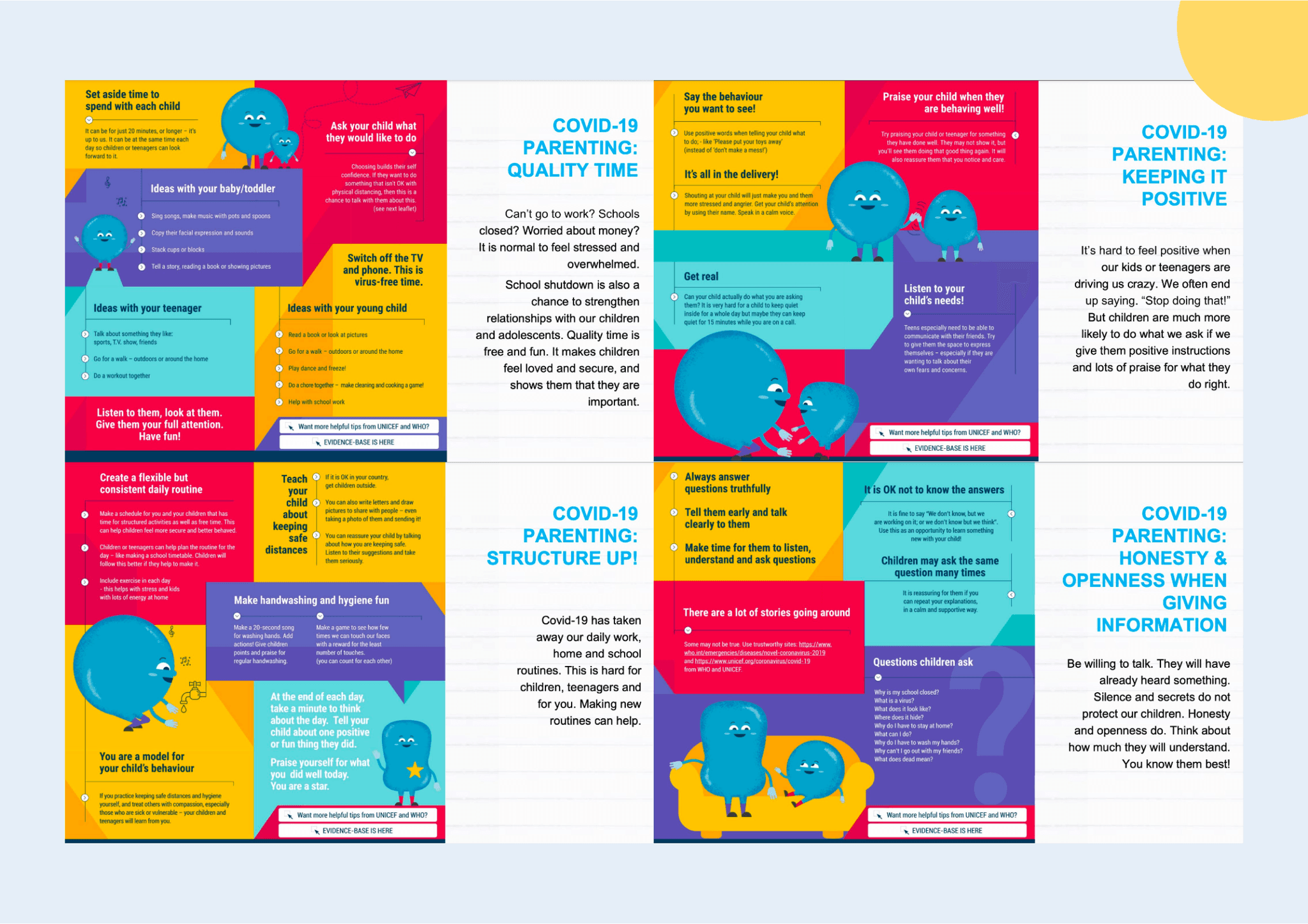
Caregivers’ Role and Remote Support:
Research highlighted the importance of caregivers, including remaining family members or foster care, in providing emotional stability. However, these caregivers are often overwhelmed with their own grief or responsibilities, which reduces the emotional support they can offer to children. This creates a need for a solution that enables remote emotional support, where caregivers can stay involved and monitor the child’s well-being even when not physically present.
This insight helped refine Tara’s companion app, where caregivers can set routines, monitor progress, and access recordings, ensuring the child’s emotional needs are met even remotely.
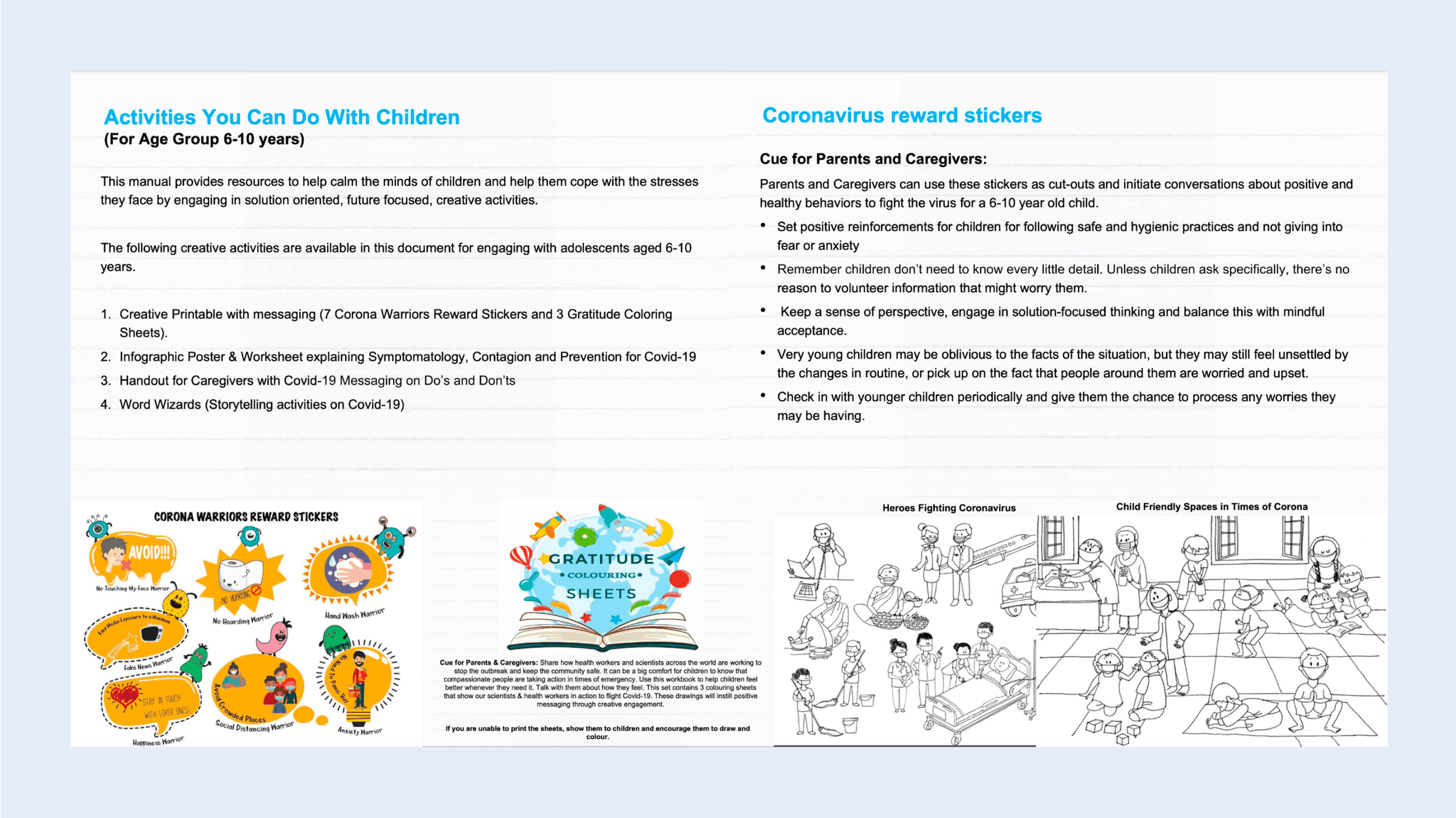
Importance of Daily Routine and Familiarity:
Children thrive on routine, and bereavement often disrupts their daily life, causing additional anxiety. Establishing familiar routines, such as waking up, attending school, and bedtime, was found to be a key factor in helping children feel secure.
This finding guided the development of Tara’s AI-powered reminders and routines, which help children re-establish their daily structure and give them a sense of normalcy.
Iterations
Refining Tara
The design solution for Tara evolved through several key iterations, each refining the concept based on research findings, feedback, and user needs. The iterative process was crucial in transforming Tara from a basic toy into a sophisticated AI-powered emotional support system tailored to the needs of bereaved children.
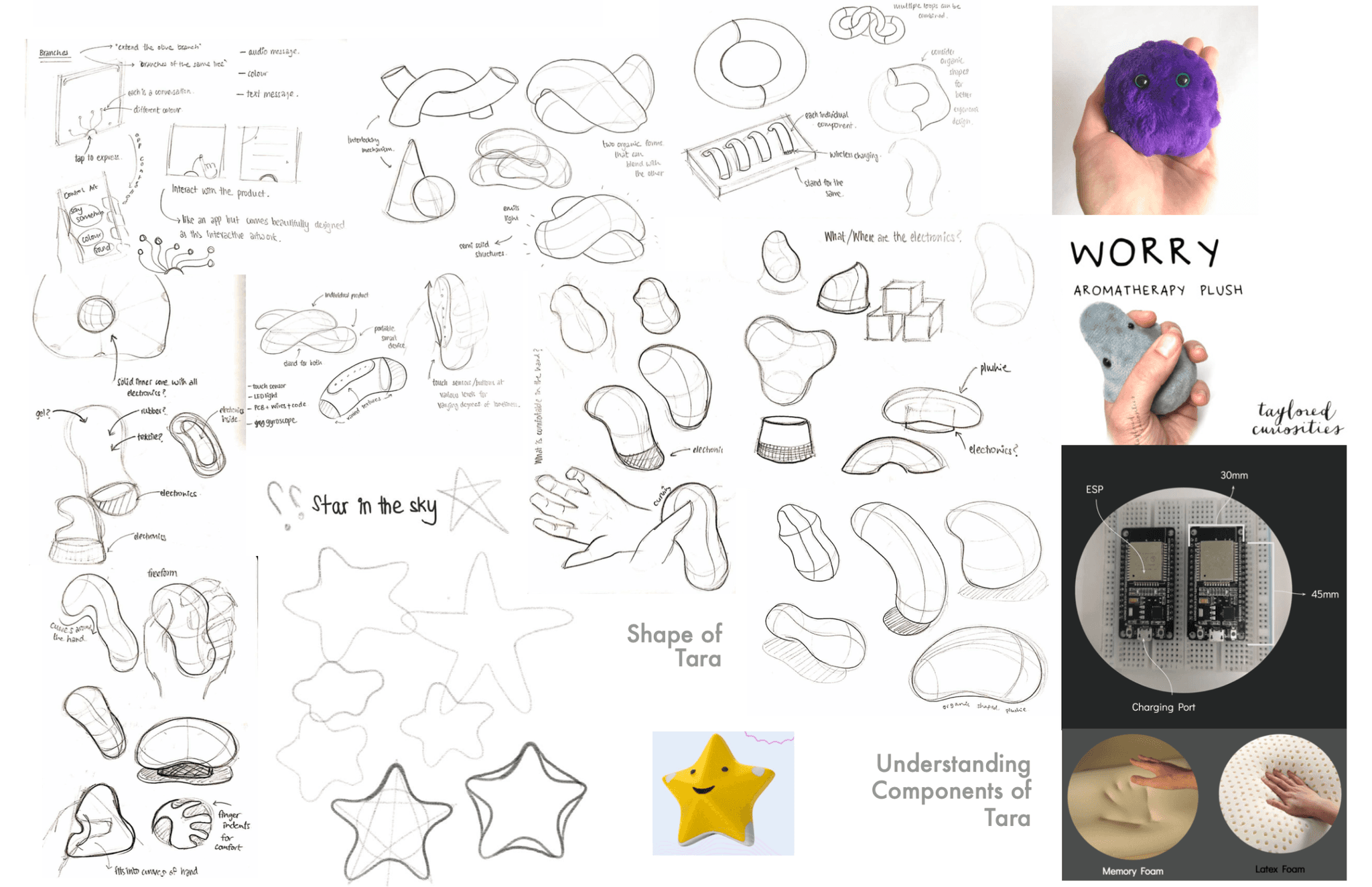
First iteration: Basic plush toy design.
Initial Concept: A Simple Comfort Toy
In the first iteration, Tara was conceptualized as a simple, comforting toy—a soft, plush object designed to provide children with physical comfort during their time of grief. The idea was to create a tactile companion that children could hug and keep close, offering them a sense of safety. However, feedback and deeper research into the psychological needs of bereaved children revealed that physical comfort alone would not be enough to address the emotional void caused by the loss of a parent or caregiver.
Limitations Identified:
Lack of emotional engagement or interactive capabilities.
No way for the toy to adapt to the child’s changing emotional state.
Inability to involve caregivers in monitoring or supporting the child’s emotional well-being.
Second Iteration: Introducing Embedded Electronics
In response to the initial limitations, the next iteration integrated embedded electronics into the toy. This included:
Microphones and speakers to allow two-way interaction between the child and Tara.
Cameras for recording audio and video, enabling the child to express themselves or share moments.
Buttons to let the child initiate interactions, such as recording a message or listening to Tara’s responses.
This version made Tara more interactive, encouraging children to express their emotions verbally. However, while this iteration added some interactivity, it still lacked the depth of emotional engagement needed to respond dynamically to a child’s emotional state.
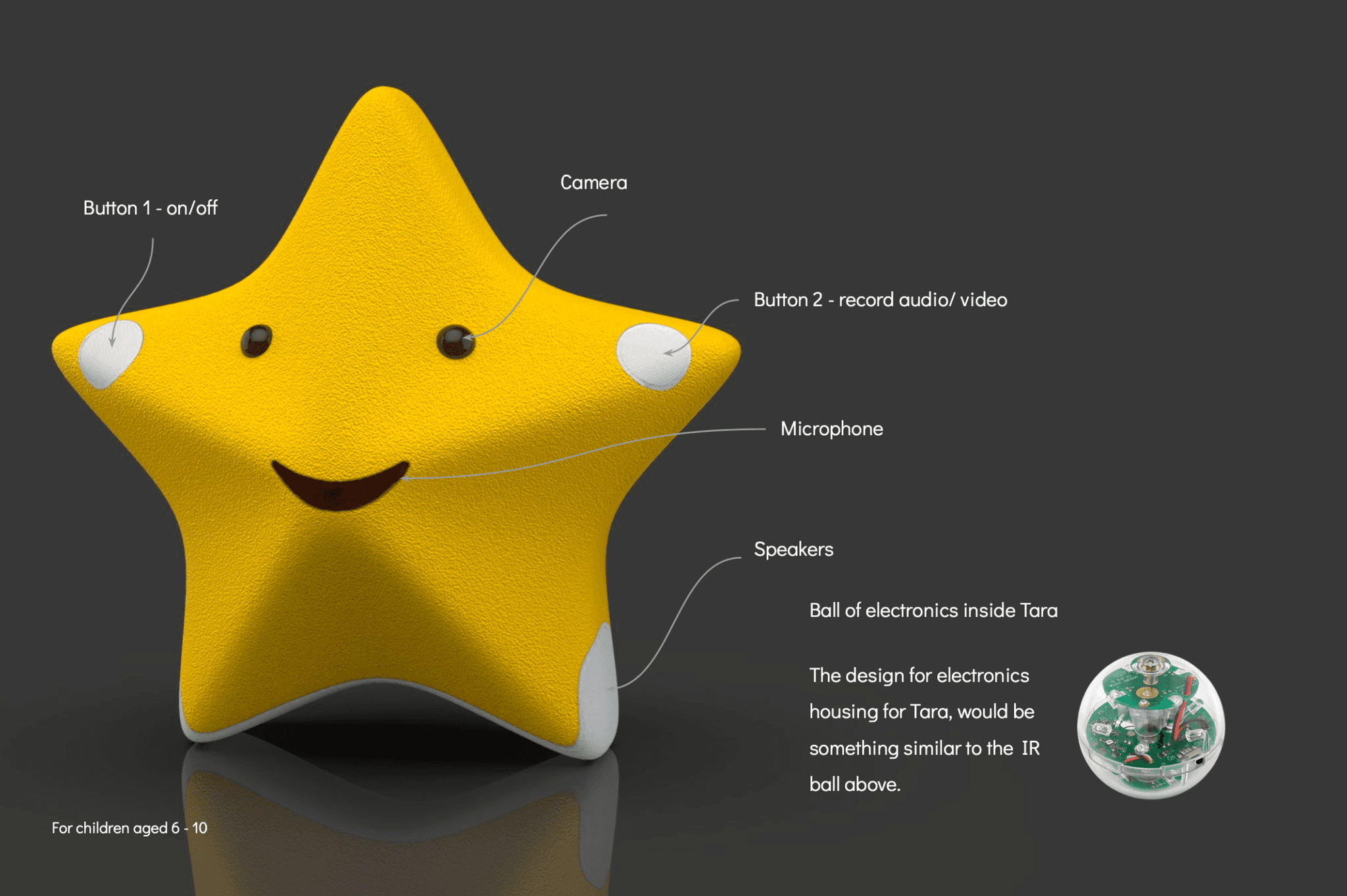
Second iteration: Addition of microphones, speakers, and cameras.
Final Iteration: AI-Powered Emotional Companion
The final iteration brought the most significant evolution: AI/ML technology to create a smart companion that could engage in real-time, meaningful conversations with the child. This version of Tara could:
Recognize emotional cues based on conversations and adjust responses accordingly, offering personalized support.
Engage in daily routines, such as greeting the child in the morning, asking how their day went, or reminding them of important tasks, helping to restore structure and familiarity in their life.
Improve over time using machine learning, enabling Tara to grow with the child, becoming more effective as an emotional companion the longer it interacts with the child.
This iteration also introduced the companion app for caregivers, allowing them to set reminders, monitor Tara’s interactions with the child, and access recorded messages. The app created a two-way system of care where caregivers could remain involved in the child’s emotional well-being without being physically present.
Key Features in Final Iteration:
AI-Powered Conversations: Tara engages in adaptive conversations, helping the child express their feelings, cope with grief, and develop emotional resilience.
Routine Building: Through the app, caregivers can establish routines that Tara will help enforce, such as reminders for waking up, doing homework, or preparing for bed.
Emotional Monitoring: Tara’s ability to capture audio and video lets caregivers track the child’s emotional state, offering insights into their well-being.
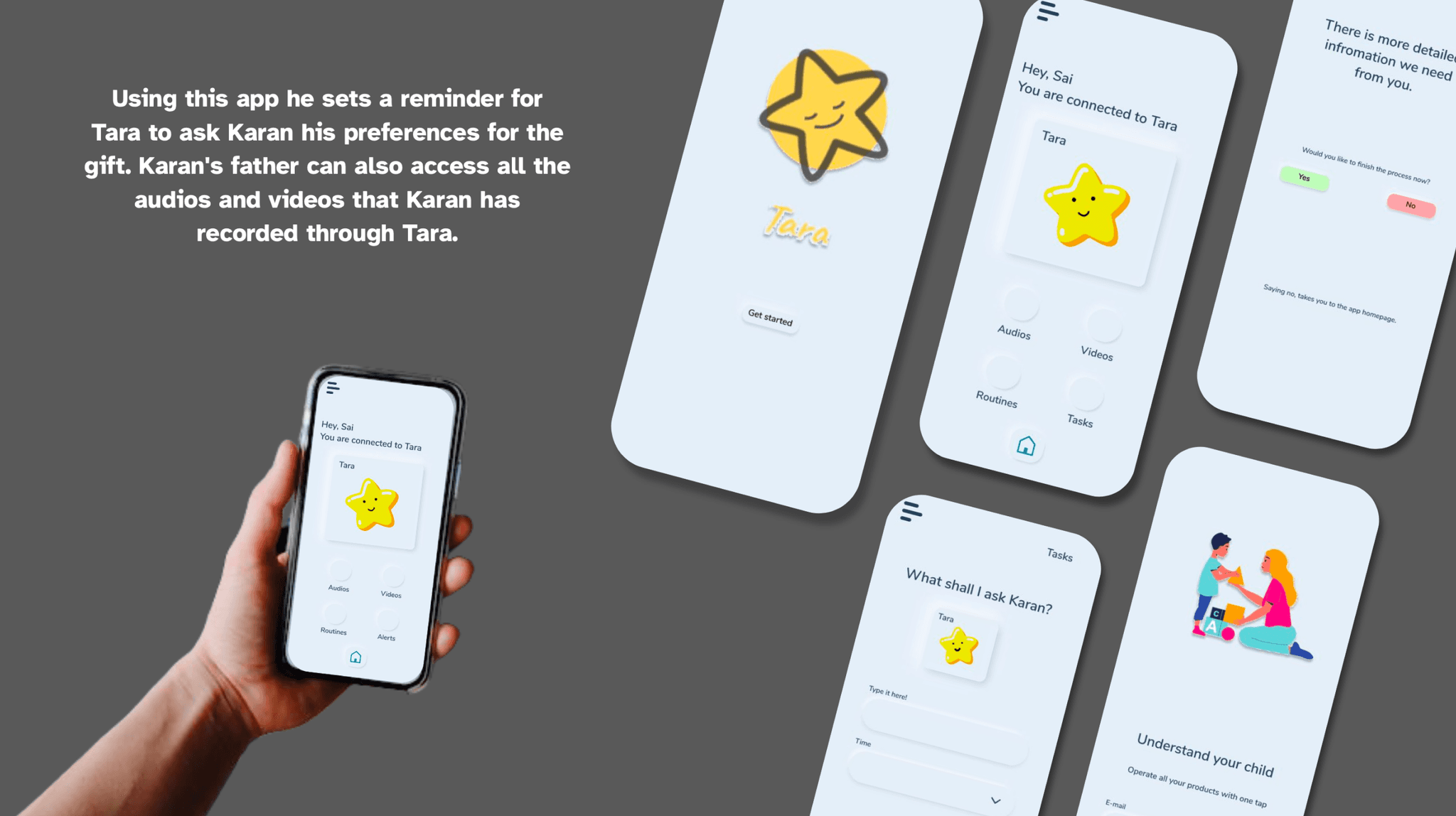
Final iteration: Tara with AI/ML integration, app interface, and caregiver interaction. Including an internal breakdown of how the electronics fit within the soft exterior can also demonstrate the seamless integration of technology into the comforting toy design.
Challenges and Solutions During Iterations:
Challenge: Making Tara both interactive and comforting without overwhelming the child with too much technology.
Solution: The physical design remained soft and simple, while the embedded electronics were seamlessly integrated to preserve the toy’s comforting appearance.
Challenge: Ensuring Tara’s AI was sensitive to the emotional state of the child.
Solution: AI/ML was programmed to respond empathetically, using verbal and non-verbal cues from the child’s conversations to adjust the tone and content of responses.
Design Solution
Tara: The Companion of Hope
The final design solution for Project Tara is a comprehensive emotional support system that combines the physical comfort of a plush toy with the intelligence of AI/ML technology. Tara serves as a smart, interactive companion for children who have lost their caregivers, providing both emotional and psychological support.
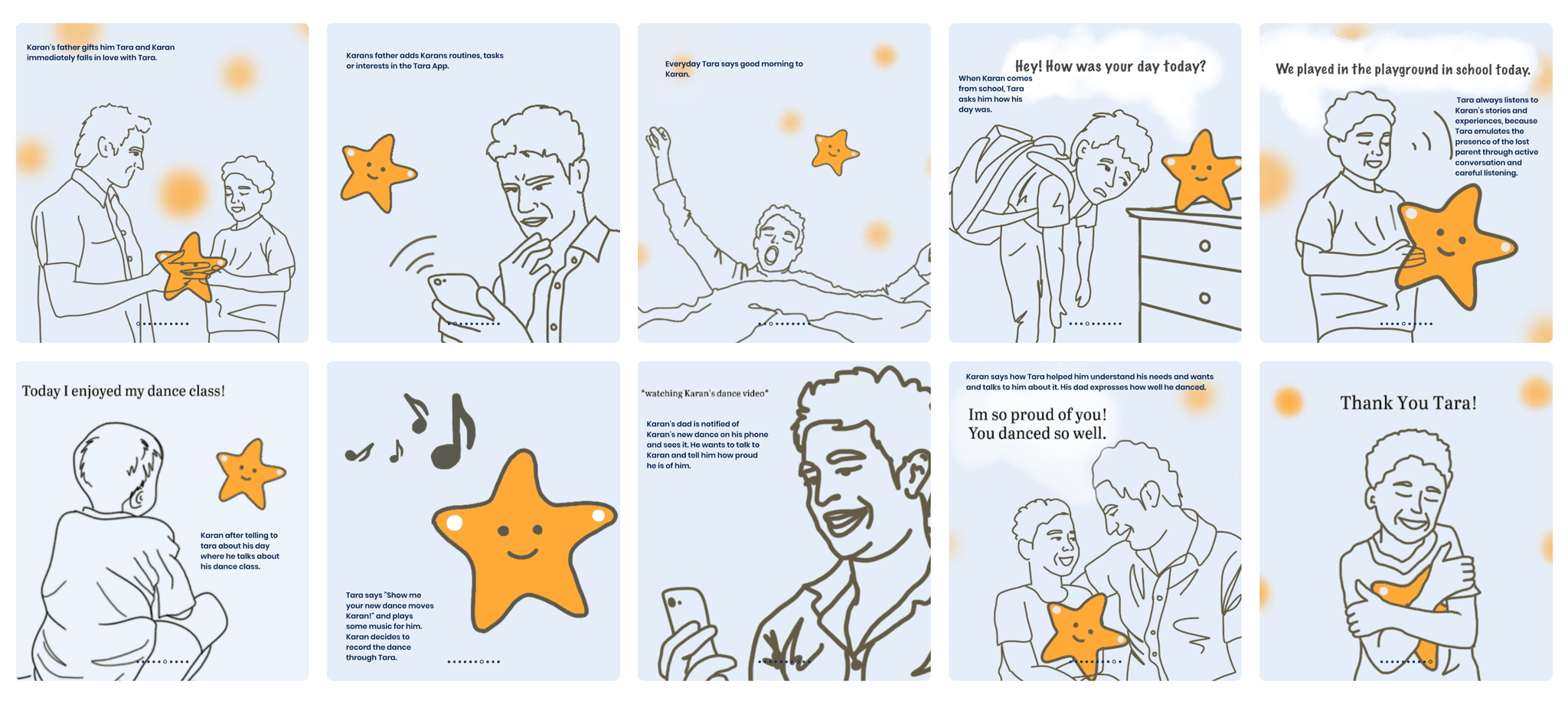
Physical Design: Soft and Comforting
Tara is designed as a plush toy, made from soft, child-safe materials like memory foam and down polyfill to ensure physical comfort. The toy’s friendly, approachable design allows children to connect with it emotionally, just like they would with a favorite stuffed animal.
Key Features:
Soft Exterior: Provides tactile comfort, soothing children who are experiencing grief.
Ergonomic Shape: Designed to be hugged and held, allowing children to physically express their emotions.
Child-Friendly Materials: Non-toxic, hypoallergenic, and durable, making Tara suitable for daily interaction by children aged 6-10.
Embedded Technology
Tara’s exterior hides the sophisticated electronics within, making it more than just a toy. The embedded technology is designed to enhance emotional engagement without detracting from the toy’s comforting appearance.
Key Components:
Cameras and Microphone: Two small cameras and a microphone allow Tara to record videos and audio, enabling children to share stories, thoughts, and feelings when they need someone to talk to. These recordings can also be accessed by caregivers through the companion app.
Speakers: Tara uses speakers to communicate with the child, offering verbal encouragement, asking questions, or sharing reminders based on the child’s daily routine.
Buttons: Simple buttons allow the child to interact with Tara at their own pace, such as starting or stopping a conversation, recording a message, or listening to a reply.
AI/ML-Driven Emotional Engagement
The heart of Tara’s design is its AI-powered conversational capabilities. Using machine learning, Tara can have dynamic, personalized conversations with the child, adapting to their emotional state and providing appropriate responses.
AI Features:
Adaptive Conversations: Tara recognizes emotional cues from the child’s voice and words. For instance, if a child expresses sadness or frustration, Tara responds empathetically, offering comforting words or suggestions for calming activities.
Routine-Based Interactions: Tara greets the child in the morning, checks in after school, and says goodnight at bedtime. By establishing daily routines, Tara helps children regain a sense of structure and stability.
Contextual Learning: The more time Tara spends with the child, the more it learns about their preferences, routines, and emotional patterns. Over time, Tara becomes more personalized and better at providing targeted emotional support.
Companion App for Caregivers
Tara comes with a companion app that allows caregivers to stay involved in the child’s emotional well-being remotely. The app connects to Tara via Wi-Fi or Bluetooth, enabling caregivers to monitor interactions, set reminders, and receive updates on the child’s emotional state.
App Features:
Routine Setting: Caregivers can program Tara to help the child maintain daily routines like waking up, school time, and bedtime. Tara then reminds the child and encourages them to follow through.
Emotional Monitoring: The app gives caregivers access to audio and video recordings made by Tara, providing insights into the child’s mental health and emotional state.
Remote Engagement: Caregivers can send messages or set up conversations between the child and Tara, making it possible for the child to feel supported even when their caregiver isn’t physically present.
Scalable Design
While currently envisioned as a soft toy for children aged 6-10, Tara’s multimodal system allows for scalability across different age groups and platforms. The system could be adapted into:
Chatbot for Older Children: Tara could evolve into a digital chatbot for teenagers, providing emotional support through text or voice-based conversations.
Phone Helpline: For immediate emotional assistance, Tara’s technology could be integrated into a phone helpline where children can call to speak with Tara-like support.
Study Companion Gadget: For older students, Tara could be a gadget placed on their study table, offering motivation, reminders, and emotional support as they navigate academic challenges.

Design Solution
Outcome
Tara successfully addresses the emotional and psychological needs of children who have lost their parents or caregivers due to the COVID-19 pandemic. The final design provides a combination of physical comfort, personalized emotional support, and routine-building assistance, making it a holistic solution for bereaved children. By integrating AI-powered conversations and the ability for caregivers to stay connected through the companion app, Tara ensures continuous care, even when caregivers are not physically present.
Emotional Support: Tara engages children in meaningful, empathetic conversations, helping them express their grief and reducing feelings of isolation.
Routine Reinforcement: Tara helps children establish daily routines, offering structure and familiarity, which are crucial for emotional recovery during grief.
Caregiver Involvement: The companion app allows caregivers to stay connected with the child’s emotional progress, providing remote emotional care and insight into the child’s well-being.
Impact
Emotional Well-Being of Children:
Tara has a direct impact on the emotional well-being of children by providing them with a constant companion during difficult times. The adaptive, AI-driven conversations help children process their emotions in a safe, non-judgmental environment, reducing the psychological toll of grief.
Strengthened Caregiver-Child Connection:
Tara empowers caregivers to remain an active part of the child's emotional journey, even from a distance. By monitoring the child’s interactions and setting routines through the app, caregivers can provide a sense of security and involvement, which supports the child’s emotional recovery.
Building Emotional Resilience:
Through daily interactions, Tara helps children build emotional resilience. The toy encourages children to express their emotions and engage in activities, which helps them gradually recover from the trauma of loss. This emotional resilience sets the foundation for healthier long-term mental health outcomes.
Increased Awareness of Mental Health Support:
Tara also plays a role in breaking down societal stigmas around mental health by offering an accessible, non-intrusive method of emotional care. This could lead to more open conversations about mental health and bereavement support for children, encouraging families to seek further help if necessary.
